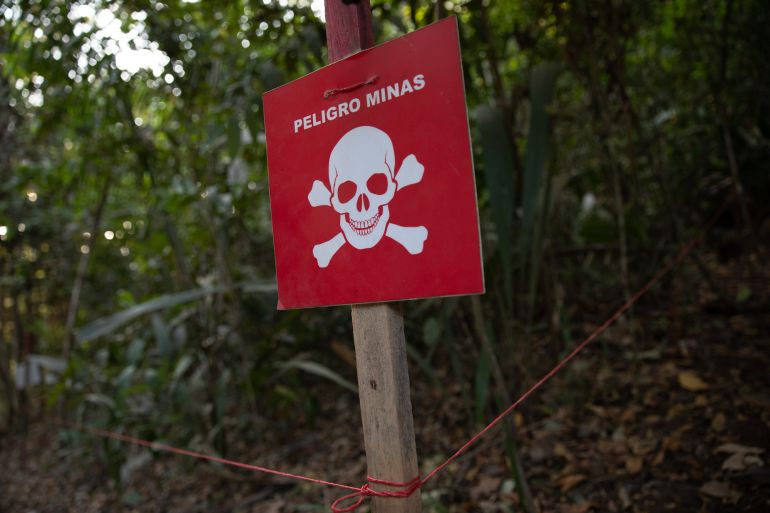Red Cross finds deteriorating conditions for Colombia’s civilians
As armed groups continue to jostle for power, the Red Cross reports a six-year high in civilians injured by explosives.

A new report from the International Committee of the Red Cross (ICRC) has found that violence between armed groups in Colombia continues to displace and maim civilians.
In their annual report on the country’s humanitarian situation, the ICRC found that while violence between the Colombian military and armed groups has dropped, more than 180,000 civilians were displaced in 2022 as non-state organisations wrestle for control of territory and resources.
Keep reading
list of 3 itemsColombia, Ecuador work to protect Indigenous people from attacks
Colombia, ELN rebels hail progress in second round of peace talks
“Unfortunately, the deterioration of the humanitarian situation continued in a large part of the country during 2022,” Lorenzo Caraffi, head of the ICRC delegation in Colombia, told reporters.
Caught in the middle are civilians who suffer from the presence of landmines, the threat of violence from armed groups and attacks on healthcare workers.
Wednesday’s report found that about 39,000 people were confined to their villages for days or weeks at a time due to the threat of violence. Medical missions were attacked 426 times, and 515 people suffered injuries from landmines and other unexploded ordinances, the highest rate in six years.
For nearly six decades, Colombia has had to contend with an ongoing internal conflict between government forces, right-wing paramilitary groups aligned with the state, drug traffickers, criminal organisations and left-wing rebel groups.
In 2016, a peace treaty brought a fragile end to 52 years of conflict between the government and the country’s main rebel group, known as the Revolutionary Armed Forces of Colombia or FARC.
But dissidents who opposed the peace deal continued to fight and smaller rebel groups and criminal organisations have stepped in to fill the vacuum left by the FARC. Many seek control of lucrative drug-trafficking routes and illegal mining enterprises, with rural and Indigenous communities paying an especially high price as a result of the violence.
Colombia’s Truth Commission released a final report in 2022 indicating that 450,664 people had been killed between 1985 and 2018 due to the fighting. A further 121,768 had disappeared. The report called for government reform, particularly in drug policy, to lessen the violence.
In August, Colombia inaugurated its first left-wing president, Gustavo Petro, who championed a goal of “total peace”. Since his inauguration, Petro has negotiated with armed organisations like the National Liberation Army (ELN), the largest remaining rebel group in the country, in the hope of achieving a ceasefire.
Petro’s policies mark a departure from that of his conservative predecessors who embraced a militarised approach to issues like drug trafficking.
The ICRC welcomed Petro’s efforts, stating in a bulletin that the organisation hopes the negotiations will translate into durable improvements for the civilian population.